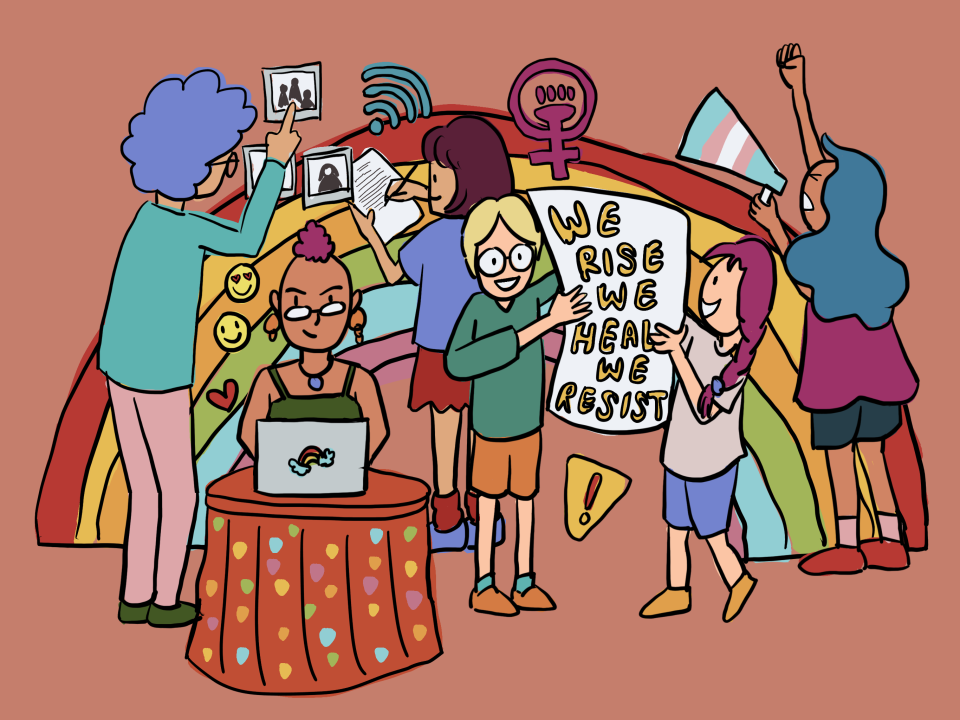
With its diverse ethnicities and cultures, Indonesia has celebrated gender diversity even before the country's independence. This is indicated by the existence of five genders in the Bugis (South Sulawesi) tradition, namely: Makunrai (female), Oroane (Male), Calabai (Male with women soul), Calalai (Female with man soul) and Bissu. Bissu have a high and respected position in the social structure of Bugis society. They are the leaders of ancient Bugis religious rituals. Various information related to these five genders are written in Sureq I Lagaligo[1]. Unfortunately, there were upheavals from armed groups who disagreed with the regime during the Old Order in Indonesia. This group conducted Operation Toba (Operation of Repentance), which targeted the bissus. They were arrested and forced to become men, even some of the bissus were killed because they were not willing to leave their traditions.
After the Old Order regime ended, Indonesia entered the New Order regime. During the New Order era, various things, including social movements, freedom of the press, as well as freedom of expression, were heavily controlled by the state. This went on for 32 years until the leader of the new order was finally overthrown by the people's power in 1998. It's called the reformation era, resulted in the growth of social movements, and the press also gained more freedom to report various social and political criticisms to the government. However, freedom of expression, especially in regard to gender identity and sexual orientation, is still being rejected by multiple groups.
Freedom of expression, especially in regard to gender identity and sexual orientation, is still being rejected by multiple groups.
Although lesbian, gay and bisexual are no longer classified as mental disorders in 1993 Classification of Mental and Behavioral Disorders published by Minister of Health, Lesbian Gay Bisexual Transgender Intersex and Queer (LGBTIQ) people still have to continue to fight for their rights as citizens. Transgender groups even have to risk their lives to show themselves, while queer persons and groups do not get space in a society with a strict gender classification of men and women. The existence of transgender and queer people is considered a threat to the order of life as "normal" human beings. The influence of patriarchal culture and a heteronormative way of life makes people, who identify as trans and queer are excluded from and by the social system. Moreover, gender diversity that has embedded in Indonesian culture and tradition, received a fact reversal: that this diversity comes from the “Western culture”.
In June 2015, the United States, under President Obama, became the 21st country that constitutionally granted same-sex marriage rights. This legal decision drew unfavorable reactions in Indonesia, including from the Minister of Religion. He stated that same-sex marriage was unacceptable in Indonesia with a religious population.[2] One of the national television stations also specifically held a debate about same-sex marriage by presenting the MUI (Majelis Ulama Indonesia or Islamic Ulama Council) and a member of House of Representative rejected same-sex marriage. The MUI stated that it was impossible for same-sex marriage to occur because it violated Law No.1/1974 on Marriage, and it was forbidden or prohibited by religions. Furthermore, the member of House of Representative emphasised that human rights in the US are completely different from human rights in Indonesia. Whereas, in the debate, LGBT activists asserted the urgency for the State to uphold human rights for all citizens, including LGBT people, to protect them from discrimination and violence in everyday life. Moreover, in the same year, a photo of two men getting married in a traditional wedding ceremony in Bali went viral on social media. Governor of Bali and Balinese customary leaders strongly prohibit same-sex marriage.[3] The social media account that initially uploaded this photo disappeared. Later on, it was discovered that the picture was not about a wedding ceremony but a wedding celebration of an American man and an Indonesian man who just got married in the US in June.
Public officials, from ministers, to parliaments, to mayors, continuously convey hate speech in various media in early 2016. They emphasised that LGBT people threaten the national security, culture, and religious values. Defense minister declares “LGBT as part of a proxy war.”[4] The Minister for Research and Technology banned LGBT people from campus. Various universities in Indonesia rejected LGBT people through various public declarations[5] and anti-LGBT-themed seminars. A student unit activity faced intimidation because they were considered affiliated to the LGBTIQ community[6]. Furthermore, the Administrative and Bureaucratic Reform Minister said that it was not appropriate for LGBT people to be a State Civil Apparatus and, comparing that polygamous men are acceptable and natural compared to LGBT people. However, the Minister of Religion stated not to hate and be hostile because LGBT people are also citizens, but on the other hand, he also highlighted not to be permissive with LGBT movements that violate religious and family values, as well as national identity.
Public officials, from ministers, to parliaments, to mayors, continuously convey hate speech in various media in early 2016. They emphasised that LGBT people threaten the national security, culture, and religious values. Defense minister declares “LGBT as part of a proxy war.”
In 2016, electronic media and social media became a strategic medium for various institutions expressing their rejection towards LGBT people and limiting access to information about LGBT community. The Indonesian broadcasting commission and Indonesian Child Protection Commission prohibited what were deemed to be promotion of LGBT issues on TV and radio through content blocking so that children and youth won’t imitate or justify "LGBT behavior."[7] The Vice President also stopped the UN and foreign donor agencies from funding LGBT issues because it encourages LGBT campaigns and promotions. He also discouraged LGBT people to publish information on the internet that promotes the LGBT movements[8]. This state of moral panic was automatically used by various mass organisations and intolerant groups to increasingly call for the rejection of LGBT people in many places[9]. This situation led to the violent forced closure of the Transgender Islamic Boarding School in Yogyakarta[10]. Throughout 2017, the Ministry of Communication and Information has regularly blocked various applications and sites with LGBT content to prevent the spread of 'LGBT propaganda on the internet.[11]
In the crackdown phase, the trans women community, transmen or someone who is considered a woman but looks like a man, is increasingly receiving discriminatory treatment and are becoming victims of violence. Various eradication efforts were carried out, ranging from evictions from their homes and raids in gathering rooms to targeting people who were considered movers in the community, causing extreme physical and mental exhaustion. At that moment, many transgender people decided to reverse their expression into what’s perceived as "normal" by the society to feel safer. So, for example, many transwomen cut their hair short and wear "men's" clothes. Transmen also do the same, they started to wear hijab and "women's" clothes. Some transgender people who were previously part of the trans or LGBT community even labeled themselves as "ex transgender." Some of those who claimed to be ex-transgender even went further by publicly attacking LGBT persons and communities on social media or just sending direct messages and giving testimonies about being cured, and citing that all trans people can be cured.
Some transgender people who were previously part of the trans or LGBT community even labeled themselves as "ex transgender."
The LGBT movements in Indonesia have to take few steps back because the spaces for freedom of expression and assembly have been taken away by people and groups who act arbitrarily in the name of morality and religion. However, supports poured in from various individuals and groups such as human rights organisations, at the local and national level as well as various statements of support put out by national human rights institutions that gave hope for the continuation of the struggle for LGBT rights in Indonesia. The issuance of security guarantees for LGBT activists to convey their aspirations across the country from the National Human Rights Commission, made them (the LGBT communities) feel somewhat safer.
It is not easy to collect strength and affirmation in a situation where hate narratives and accusations of 'LGBT propaganda and promotion' are carried out by both the state and the society. This situation has significantly impacted individuals’ and organisations’ ability in organising and building public awareness about LGBT rights. However, in 2017 Qbukatabu was born with a belief that access to information and services with a feminist and queer perspective should be available in online spaces.
In the challenging situation, Qbukatabu reflected upon the framework in the content production during that time. It was at the end of 2018 when Qbukatabu created a theme, namely 'Emotional Archives Collection.' It was an experimental process of archiving feelings, inspired by Ann Cvetkovich, a queer feminist who works on archives study and movement. Cvetkovich described that the practice of archiving, in the form of writing, pictures, videos, etc., is also about collecting and storing various feelings and emotions regarding life traumas and daily life resistance, especially for queer people.
Cvetkovich described that the practice of archiving, in the form of writing, pictures, videos, etc., is also about collecting and storing various feelings and emotions regarding life traumas and daily life resistance, especially for queer people.
In the Archive of Emotions Collection batch 2 titled “Diving into the Journey of Those Who Fight”, Qbukatabu asked the LBT organisation to share their archives to be digitalised and published in a short article. On the article of “Karya Bercerita, Membuka Suara” (A Story Tells, Opens Voices), there was a photo series titled Bekasmu, Berkatku. These photos depict the activities of WD, a masculine lesbian woman in Central Java making art and crafts. In the caption, WD told a story of the challenges she has to face when people gave negative comments about her masculine gender expression.
In another article entitled “Memoar Mami Henny”, Qbukatabu took photo of several diary pages of Mami Henny HS, a transwoman activist in Yogyakarta who passed away in 2016. In one of the pages we digitised, Mami Henny raised the situation of transwomen as a Waria Tuna Susila (WTS), meaning a transwoman sex worker. This abbreviation of WTS is a derogatory label and commonly given towards cis-women sex workers. In this way, Mami Henny addressed the similar situation faced by cis-women and transwomen for economic survival.
This process of documenting various experiences that shows how the state commits violence against the LGBT community will continue to be carried out as a form of resistance against injustice; because it is challenging for the LGBT community to get a proper and equal dialogue space with the government. Even if there is an opportunity for dialogue, it feels like the activists feel like a broken radio that repeat the same thing over and over again, because the only thing that the government does is to “receive complaints” but never show any progress of taking efforts to fulfill the rights of LGBT people as citizens. Discriminatory regulations and policies continue to be produced, and the resolution of cases where LGBT people are victims also seems convoluted.
Speaking of the government’s policy, at the beginning of the COVID-19 pandemic in 2020, the Indonesian government issued a "work from home," or WFH regulation, resulting in a shift in offline activities to online. It has become an opportunity for the transmen movement to organise. Apart from the security of various tools and media, this moment has made it possible for many people from multiple regions to get together in online setting.
This has inspired Transmen Indonesia to create a space for sharing stories to strengthen, look after and support each other among transmen in Indonesia. This is the first time that female-to-male transgender individuals with various terminologies they use to identify themselves convened. There were 56 people - transmen, priawan, and butchy - from 15 provinces in Indonesia who attended online focus group discussions. According to Amar Alfikar, the group facilitator, the meeting was emotional. Most people stated that it was the first transmen forum they had attended. They felt happy joining this space because they feel safe and free to share stories.
Most people stated that it was the first transmen forum they had attended. They felt happy joining this space because they feel safe and free to share stories.
The discussion process brought the participants into the memories of 2016 where the moral panic systematically produced hate speech towards LGBT people. Participants shared about their struggle with self-acceptance, from their internal struggle related to faith to fear of losing space to gather or the end of the movement itself. On one hand, the transmen who joined this process were aware that people are easily provoked by social media posts. On the other hand, the information about transmen is still limited. Therefore, Transmen Indonesia collaborated with Transmen Talk Indonesia to make an educational video about female – to male transgender people[12]. The video aims to bring awareness to everyone who want to know further about transmen.
In addition to producing learning tools, archiving experiences, emotions, and various things the LBT community organisers faced, Qbukatabu also seeks for a medium for healing from the impacts of hate speech that we experienced because of our gender and sexual identities. Yulia reflects on the archive of feeling through the Qbukatabu creative writing process for feminist and queer activists in 2021.
During the pandemic, 15 activists came together in the online space to write about one story that happened in their lives and published those writings as an anthology. The writing process took a month through a series of online classes facilitated by an Indonesian artist and writer, Reda Gaudiamo. The class was started with a task to have a daily journal within a week. Yulia agreed that the journaling was given in the beginning as a way to express various feelings that are often ignored or suppressed. The writings in the journal became an inspiration for the feminist and queer activists to decide specific themes or events for their writing journey. The writing varies, from personal essays, short stories, letters, and poetry. At the end of the writing process, the writers agreed to publish the anthology through an indie publisher.
Gege, one of the bisexual writers from Sulawesi, expressed her feelings about the writing journey, “In the beginning, I was confused: why do I have to write a journal every day? Then, I got the answer: I now am grateful for my body and keep encouraging myself. Sometimes I think that all of the results occur in our life should just be kept for ourselves, bad or good. But then I realise that the results can also be shared and enjoyed together.” Inaya Wahid, a cultural activist and a daughter of the late Abdurrahman Wahid, gave her comment on this book “I feel that this (book) should be appreciated; it is so awesome! I remember that a friend says this to me: 'keep writing because it helps you to heal, and then, it also helps others to heal.' I can relate to all these stories and struggles. I thought I will read very severe stories, yet I feel light and warmth reading this book.”
'keep writing because it helps you to heal, and then, it also helps others to heal.'
The ongoing challenges of queer and transmen organising in online spaces still persist. In this case, Qbukatabu and Transmen Indonesia have tried to be strategic in creating hashtags for posting content on social media. However, negative comments for our posts from mid-2020 are unavoidable. On the Qbukatabu account, these comments appear on content that discuss about domestic rape, personal stories of queer people and hormonal therapy for the trans community.
We are keeping our resistance going and be mindful about the risks. In the context of fighting against massive hate speech perpetrated by state, collaboration and solidarity with local, national, regional, and international groups are urgently needed. We are very open to learn and share; please contact us via transmenindonesia@gmail.com and qbukatabu@gmail.com
About the authors :
This article is written by Raiz and Yulia. We work for Lesbian Bisexual Transmen and Queer (LBTQ) rights in Indonesia since 2010. Our positionality and organising experiences are different. Raiz is a transman who has experiences in organising the LBTQ community through LBT organisation since 2011 and has focused specifically on the transmen movement through Transmen Indonesia (TI)[13] since 2015. Meanwhile, Yulia is a queer woman who has experiences integrating LBTQ rights into the struggles of women's, interfaith, and youth movements. Since 2017 Yulia has specifically strengthened the feminist-queer movement with LBTIQ individuals and groups as the main constituents through Qbukatabu[14].
Footnotes
[1] The holy book of the Tolotang belief (local belief in south Sulawesi), in the form of a poem that tells about the origin of human creation and the life almanac of the Bugis civilization
[2] https://www.thejakartapost.com/news/2015/07/02/difficult-indonesia-legalize-gay-marriage-minister.html
[7] https://m.tribunnews.com/nasional/2016/02/12/kpi-larang-promosi-lgbt-di-tv-dan-radio https://www.hrw.org/news/2016/02/16/dispatches-indonesia-censors-lgbt-radio-and-tv
[8] https://www.thejakartapost.com/news/2016/02/16/govt-demands-undp-remove-funding-lgbt-programs.html
[9] https://www.antaranews.com/berita/1033960/gerakan-tolak-lgbt-dibentuk-sejumlah-organisasi-di-tanjungpinang
[10] https://www.thejakartapost.com/news/2016/02/26/yogyakarta-transgender-islamic-boarding-school-shut-down.html
- 2044 views







Add new comment